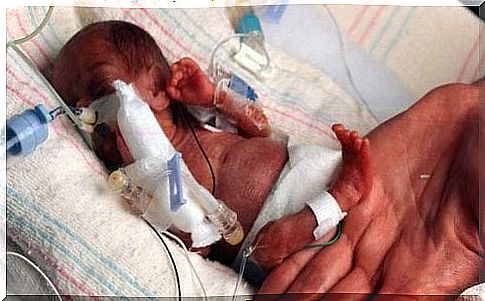Wonderful News: More And More Premature Babies Are Surviving

It’s one of those wonderful news that we’d love to share. We enjoy talking about such things because it is something that gives us hope: more and more premature babies survive.
In fact, almost 67% of babies born between the 24th and 25th weeks survive. Those born between the 23rd and 24th weeks have a 27% chance of survival.
The numbers are positive, especially when we compare them to data from 15 years ago. Without a doubt, we owe this to science and the latest medical and technological advances.
However, as the experts explain, the biggest challenge is ensuring that premature babies survive without suffering serious health consequences.
Because that is undoubtedly an aspect that is not always talked about. A child born in the 23rd week has a certain chance of survival. However, the question of whether it grows up without serious development problems is always very complex.
The family needs help from all sides: advice, information and advice, social support and adequate health insurance. As a result, efforts can be made to ensure that the child can lead a life that is as inclusive, happy and autonomous as possible.
The subject of extreme premature babies is a very complex and sensitive one. Behind every child who makes it there is a story of overcoming. A story of strong parents and struggling mothers. But above all, it is the story of incredible children who cling to life with all their might and should be great role models for all of us. We tell you about it in “I am mother”.
Much more premature babies survive

The medical journal “Anales de Pediatría” has some interesting data to think about. One of them is the fact that the number of premature babies has doubled in recent years.
The causes are not yet fully understood. The only reason cannot just be that more and more mothers are giving birth at a later age. Factors such as abnormalities in the placenta, infection, smoking, poor diet, etc. are also risk factors.
However, not only has the number of premature births increased, but also the life expectancy of premature babies. One medical advance that has contributed to this is undoubtedly the surfacant technique.
What is surfactant?
It is a medical measure that makes it possible to help the baby absorb oxygen when their lungs are not yet mature. This will reduce the tension in the alveoli, which will prevent them from collapsing and breathing difficulties.
It is undoubtedly a medical breakthrough that allows extremely premature babies (between the 23rd and 25th weeks) to survive.
Changes to guidelines that allow extreme premature babies to survive
The guidelines for caring for mothers expecting premature birth have changed over time. Supplying mothers with corticosteroids, for example, causes babies’ lungs to mature a little better before they are born.
As a result, fewer and fewer babies are intubated immediately after birth. There are also fewer infections. All of this undoubtedly helps babies born prematurely to start life with their parents. A life that they deserve and that their family has dreamed of.

Extremely premature babies, miracle babies
Extreme premature babies spend an average of 95 days in the hospital. During this time the parents are not alive – they “survive” as they can: with anxiety and the constant worry that their baby’s condition will change within hours. This is not easy.
There is a reason parents are always concerned about their baby’s condition. They know that every time you have to resuscitate a premature baby, the risk of neurological sequelae increases.
The child can survive but is most likely to become disabled or develop a developmental disorder.
We must remember that a normal pregnancy lasts 40 weeks. Today, however, many hospitals are confronted with babies who are between 20 and 22 weeks old. Scientific and statistical data show that infants less than 24 weeks old are almost not able to survive.
In fact, the limit and starting point for viability is usually set at the 25th week.
However, some experts say that a baby less than 25 weeks old has a better chance of survival if a hospital is well qualified to provide perinatal care.
The problem then, however, is what that baby’s quality of life will be like later on and what possible consequences it will have for his development.
We can only hope that extremely premature babies can survive without problems in the future and be as healthy and strong as any other child.









